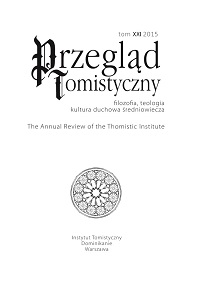Transforming Aristotelian Philosophy.
Transforming Aristotelian Philosophy.
Alexander of Aphrodisias in Aquinas’ Early Anthropology and Eschatology
Author(s): Katja KrauseSubject(s): Christian Theology and Religion, Philosophy of Middle Ages
Published by: Instytut Tomistyczny
Keywords: Thomas Aquinas; Alexander of Aphrodisias; Averroes; anthropology; agent intellect; possible intellect; eschatology; beatific vision
Summary/Abstract: Most ancient Greek and Arabic Peripatetic works following the footsteps of Aristotle’s De anima and Ethica Nicomachea stood at odds with key aspects of the traditional Christian doctrines of the human soul, intellect, and ultimate happiness. Alexander of Aphrodisias presents no exception to this picture. The young Thomas Aquinas thus heavily criticises his thought on the human soul and intellect in his Commentary on the Sentences II.17.2.1. Yet at the same time, he explicitly approves of some aspects of Alexander’s thought on ultimate human happiness for his doctrine of the beatific vision in his Commentary on the Sentences IV.49.2.1. The purpose of this paper is to dissolve these seemingly paradoxical treatments of Alexander’s thought in Aquinas’ earliest work. By showing that Aquinas performs two distinctive transformations of Alexander’s Aristotelian philosophy — an anchored transformation and a dissociated transformation — I uncover how Aquinas systematically consolidates his own earliest theological anthropology and eschatology.
Journal: Przegląd Tomistyczny
- Issue Year: 2015
- Issue No: XXI
- Page Range: 175-217
- Page Count: 43
- Language: English

